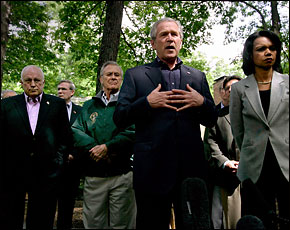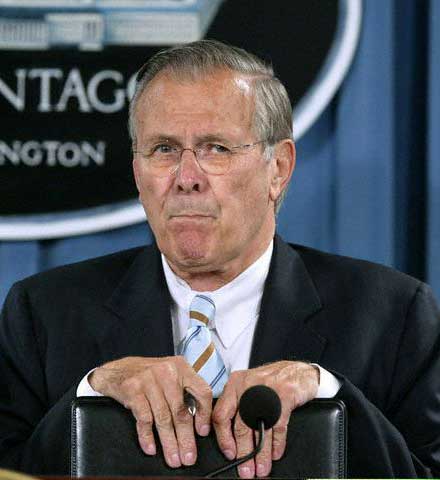“‘We screwed up and left Saddam Hussein in power. The president [then George H.W. Bush] believes he’ll be overthrown by his own people, but I rather doubt it,’ he quotes Wolfowitz lamenting [in 1991]. ‘But we did learn one thing that’s very important. With the end of the Cold War, we can now use our military with impunity. The Soviets won’t come in to block us. And we’ve got five, maybe 10, years to clean up these old Soviet surrogate regimes like Iraq and Syria before the next superpower emerges to challenge us … We could have a little more time, but no one really knows.‘” According to Salon‘s Joe Conason, Wesley Clark’s new book suggests the existence of a smoking-gun 2001 memo that outlined in full the neo-cons’ delusional ambitions for the Middle East before the Iraq War. “‘Six weeks later, Clark returned to Washington to see the same general and inquired whether the plan to strike Iraq was still under consideration…”Oh, it’s worse than that,” he said, holding up a memo on his desk. “Here’s the paper from the Office of the Secretary of Defense [then Donald Rumsfeld] outlining the strategy. We’re going to take out seven countries in five years.” And he named them, starting with Iraq and Syria and ending with Iran.’ While Clark doesn’t name the other four countries, he has mentioned in televised interviews that the hit list included Lebanon, Libya, Somalia and Sudan.”
Tag: Donald Rumsfeld
Shame of the Nation, continued.
“‘Here…comes…that famous General Taguba — of the Taguba report!’ Rumsfeld declared, in a mocking voice.” Well, the agency and the time may have changed, but it’s increasingly clear we still have a lot to answer for, thanks to the actions of those who would claim to protect our way of life. The inimitable Sy Hersh of The New Yorker (who also played a role in 1974 in getting the CIA docs released — take that, Woodward) reports in with the tale of General Antonio Taguba, the head of the Army’s original investigation into Abu Ghraib who, like so many other truth-tellers in the administration, was eventually hung out to dry for his candor. Hersh’s frightening and sadly plausible piece not only makes clear that Rumsfeld, Dubya, et al had more knowledge of the nightmare of Abu Ghraib than they’ve publicly let on, but also suggests that those repellent images we’ve all seen from the prison may only be the tip of the iceberg of the horrors that occurred in our country’s name. “Taguba said that he saw ‘a video of a male American soldier in uniform sodomizing a female detainee.’ The video was not made public in any of the subsequent court proceedings, nor has there been any public government mention of it.“
Gates is Open.
“‘[Y]ou can already feel the stability,’ said retired Air Force Lt. Gen. Charles F. Wald, formerly the deputy U.S. commander in Europe.” A few months into his stint at Dubya’s second SecDef, Robert Gates is “greeted as a liberator” in and around the Pentagon. “‘How much of it is Bob Gates as a personality, manager and leader, and how much of it is Rumsfeld being gone, is hard to say,’ said [Brent] Scowcroft, who has known Gates for 30 years. ‘Rumsfeld was a difficult man to work for.’”
Out with the Old…
Good riddance to the do-nothing 109th Congress, which wheedled its way into the history books last weekend. (And sayonara also to Donald Rumsfeld, who closed up shop yesterday.) A word of warning to the Dubya White House: Don’t expect the 110th to play as nice…
Donald Ducks.
“Clearly, what U.S. forces are currently doing in Iraq is not working well enough or fast enough.” Hewing closer to the McNamara paradigm than I’d earlier thought, Rumsfeld apparently questioned the Iraq war’s course on his way out the door. “Michael O’Hanlon, a defense analyst at the Brookings Institution, said the revelation of the memo would undercut any attempt by President Bush to defend anything resembling a ‘stay the course’ policy in Iraq.’When you have the outgoing secretary of defense, the main architect of Bush’s policy, saying it’s failing, that puts a lot more pressure on Bush.’”
With friends like these…
“‘They did this to protect themselves, but they couldn’t protect us?’ another Republican aide said yesterday.” According to Patrick O’Connor of The Hill, many GOP officials are absolutely livid about the timing of the Rumsfeld resignation. “For them to toss Rumsfeld one day after the election was a slap in the face to everyone who worked hard to protect the majority.” Meanwhile, the rest of us have to figure out how to trust this president when even he admits he openly lied to everyone about Rumsfeld’s fate (not that he was garnering a lot of confidence these days anyway.)
Rum Out.
Christmas in November continues for the reality-based community: Along with recent editorials in the Army Times, the Dem’s Election 2006 takeover claims another high-profile GOP victim in Donald Rumsfeld. He’ll be replaced by former CIA chief Robert Gates — an old papa Bush hand and current member of the Baker-Hamilton commission — for Dubya’s last two lame duck years. Dubya claimed in his press conference that Rumsfeld would’ve been gone regardless of the election returns…I’m not sure I buy that. Still, this is a very welcome move — one that should’ve happened years ago.
Army of None.
“The generals’ revolt has spread inside the Pentagon, and the point of the spear is one of Donald Rumsfeld’s most favored officers, Gen. Peter J. Schoomaker, the Army chief of staff.” Slate‘s Fred Kaplan examines the newest military complaints against Dubya and Rummy: They’ve wrecked the US Army. “This new phase of rebellion isn’t aimed at the war in Iraq directly, as was the protest by six retired generals that made headlines last spring. But in some ways, it’s more potent, and not just because Schoomaker is very much on active duty. His challenge is dramatic because he’s questioning one of the war’s consequences — its threat to the Army’s ability to keep functioning.“
House of M.
“‘[I]t kept failing to solve any problems the Navy had,’ Lowell said. ‘It looked at first as if it might have some merit. But we found out quickly it didn’t really solve the problems. And the company wasn’t very responsive and wasn’t very robust. . . . It was living entirely’ on grants from Congress.” The WP examines Project M, a Pentagon research project kept alive on congressional earmarks (to the tune of $37 million) well past its potential usefulness. “Once begun, promising but speculative programs like Project M are hard to kill, sustained by members of Congress who want to keep jobs in their districts, military officials who want to keep their options open and businesspeople who want to keep their companies afloat.“
Update: In a related story, the Post finds Rumsfeld at the switch when it comes to the Pentagon’s antiquated military procurement system. “‘DOD is simply not positioned to deliver high-quality products in a timely and cost-effective fashion,’ the comptroller general of the United States, David M. Walker, said in a little-noticed April 5 critique. The Pentagon, he said, has ‘a long-standing track record of over-promising and un-delivering with virtual impunity.’“
Hellfire Clubs.
“We can’t win this militarily. It can only be won politically; it can only be won diplomatically and internationally…And you’ve got to listen to realism and what the public wants in the United States.” Hopefully (but not likely) heeding John Murtha’s words, Dubya’s Iraq team retreats to Camp David for a strategy pow-wow. By the way, is it just me or does the “Interagency Team on Iraq” look suspiciously like the Brotherhood of Evil Mutants?



